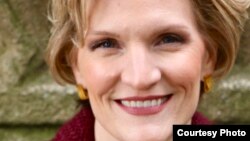Susan Mackey-Kallis is a busy woman at Villanova University, outside of Philadelphia, Pennsylvania.
Mackey-Kallis is an Associate Professor in Villanova’s Department of Communications.
Like most professors in the United States, she has many responsibilities.
Much of her job involves teaching classes on film, popular culture and the media. She also spends a lot of time doing research on those subjects.
But there is another part of her job that does not get as much public attention: her service work for the school.
Service work for a college or university can mean many things.
There is internal service work. This can include being as an advisor to individual students or larger groups, as well as serving on one or more committees. These committees can do everything from helping admit students to the school, to finding new faculty members and organizing events.
External service can include representing the school through national organizations.
Mackey-Kallis has done a lot of service work during her nearly 30 years of experience in higher education.
In fact, she received the Lawrence C. Gallen Faculty Service Award from Villanova in 2008. The award recognizes tenured faculty members who have 10 years or more of “outstanding service” experience.
For several years, Mackey-Kallis says she was doing at least 20 hours of service work in addition to her other duties. But she says that after a while, she started to realize her career was not moving forward at the same speed as other professors.
“I’ll never forget,” she said. “I was at a reception at the university and one of my male colleagues from the School of Business, who was a full professor, was talking with me and said, ‘Susan, you’re not a full professor yet?’”
Full professor is the highest position most professors can reach as a faculty member at a U.S. college or university. It comes with higher pay and greater recognition as an expert in one’s area of study.
Not every professor can become a full professor. Most colleges and universities only fill a few of these positions each year. The schools make these decisions based on many things, Mackey-Kallis says, but a professor’s research and published works are probably the most important considerations.
Mackey-Kallis has published several books. But this still was not enough to gain the attention of the group that appoints full professors at Villanova.
So a few years ago she decided to reduce her amount of service work. She says doing so much service got in the way of her career.
And a new study suggests Mackey-Kallis is not alone in this problem. A report on the study was published this month in the academic journal Research in Higher Education.
Evidence of unbalanced workloads
The study looked at the average amount of service work professors did at more than 140 U.S. colleges and universities in 2014. It also examined work-related activities of almost 1,400 faculty members at several campuses in one large university system in America’s Midwest. The study took into consideration the race, sex, areas of study and the duties of the professors.
The nationwide information showed that on average, female professors do about half an hour more service work per week than male professors. At the large Midwestern university system, the female professors were doing about 1.5 more service activities each year.
Cassandra Guarino wrote the report on the study. She is a Professor of Education and Public Policy at the University of California (UC) Riverside. She says the study did not examine why female professors did more service work. But she has some ideas.
Guarino says many female professors told her they were not surprised by the findings. In some cultures, women are asked to do more work than men while receiving less in return. The Pew Research Group reported that, in 2015, a woman in the U.S. would have to work 44 days more, on average, to earn the same amount as a man.
Guarino adds that many women feel it is harder for them to say ‘no’ when given extra responsibilities.
But in higher education, the problem for women goes beyond just saying no, she says.
“I don’t think women have [realized] that they may be asked to do more,” Guarino said. “And I think they just think they’re doing what everyone else is doing, when actually they are doing more of this other stuff that is taking away time from their research.”
Different parts to the problem
Cynthia Miller-Idriss is an Associated Professor of Education and Sociology at American University in Washington, DC. She also directs the university’s international training and education program, which is a form of internal service.
Miller-Idriss has been a professor since 2003. She says the difference in service work between the sexes is much greater than the averages the study found.
She admits that service work is very important to colleges and universities. Yet the problem is not just that women do more of it. Schools often do not place the same value on all this extra work as they do research and publishing.
“Internal service doesn’t bring the same kinds of advantages to the university in a visible way,” Miller-Idriss said. “[The university] can’t [operate] without it. But it doesn’t necessarily help with things like status or reputation, it doesn’t bring in additional resources. It can be much more invisible because it doesn’t draw external attention.”
She notes that heavy service workloads put female professors at a disadvantage. They are less able to work on the things that will do more to drive upward movement in their careers.
Susan Mackey-Kallis at Villanova, Cassandra Guarino at UC Riverside and Miller-Idriss all hope the study will bring more attention to this issue. They want faculty and administrators to think more about how much service work women are doing in comparison to men. And hopefully, schools will clarify who they are asking to do this kind of work.
Also, Mackey-Kallis admits many more women are being appointed to important jobs in many occupations than in the past. But there needs to be a change in the culture.
“Women [are still taught] to help, to be helpers, to [support] good organizations, good teamwork,” she said. “Men have been [taught] to, as you might say, ‘keep their eyes on the prize.’”
Mackey-Kallis says there needs to be more attention on what a person can do, not what they should be doing based on their sex. And professors in higher positions need to show their female colleagues it is okay to think of themselves first sometimes.
I'm Alice Bryant.
And I’m Pete Musto.
Pete Musto reported this story for VOA Learning English. George Grow was the editor.
We want to hear from you. What at are any differences between the responsibilities of male and female professors at universities in your country? How can schools do better to make sure all professors are given equal amounts of work? Write to us in the Comments Section or on our Facebook page.
_____________________________________________________________
Words in This Story
internal – adj. existing or occurring within an organization
faculty – n. the group of teachers in a school or college
external – adj. concerning relationships with
tenured – adj. having the right to keep a job, especially the job of being a professor at a college or university, for as long as you want to have it
outstanding – adj. extremely good or excellent
reception – n. a social gathering to celebrate something or to welcome someone
colleague(s) – n. a person who works with you
academic – adj. of or relating to schools and education
journal – n. a magazine that reports on things of special interest to a particular group of people
campus(es) – n. the area and buildings around a university, college or school
advantage(s) – n. something, such as a good position or condition, that helps to make someone or something better or more likely to succeed than others
visible – adj. known to or noticed by the public
status – n. the position or rank of someone or something when compared to others in a society, organization or group
reputation – n. the common opinion that people have about someone or something








